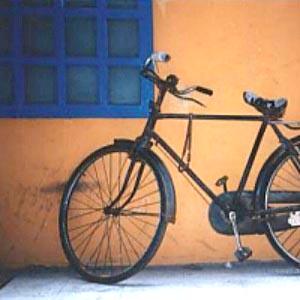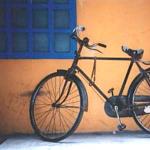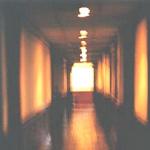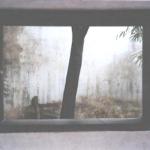Two Nights in Shanghai
Three anxious knocks bring me to the door of the shared hostel room. Behind it is the perplexed-looking face of a young man in an oversized black jersey and Yankees cap, out-of-breath and speaking quickly in a strong Californian accent. I have never seen him before in my life. "Hey man, you seen Jake around?" he says with an affinity usually reserved for old dorm pals, while in between gasps he is peeking past the doorway and scouring the otherwise vacant room.
I answer that I haven't a clue who Jake is since I've arrived only an hour earlier, and from the international airport no less. "That's cool, man, no worries. I mean if you haven't seen him then you haven't seen him, right?" He shifts his weight from one leg to the next as if manually kick-starting his thought process and leans in a little closer. "OK then dude, you wanna buy some hash, really cheap? It's good stuff, man, it's just that I gotta unload it fast since I'm going back to LA tonight." I tell him that it doesn't really interest me, to which he answers point blank that I can have the stuff for free if I want, that it would help him out a lot too.
One hour into my Chinese travels, in a country not particularly known for giving a warm welcome to drug offenders, I haven't planned on gambling my life away just yet. He leaves with an accepting smile and one of those peculiar multi-stage handshakes that is surely more complicated than learning mahjong. All of this is a good sign though, the kind of start that action movies aspire to recreate, and the kind that usually christens a great adventure.
My room at the Pujiang Hotel is a little worn around the edges but it has a history and character and that other youth hostels can only yearn for. As the Astor House Hotel, it catered to the world's A-list, a who's who of the first half of the twentieth century, from American Presidents to deposed dictators to stars like Charlie Chaplin and Albert Einstein. In fact, it was Shanghai's first hotel and this, combined with its location just off the Bund and across the street from the Russian embassy, leaves it basking in a faded yet very real aura of mystery and class.
Before long I learn that I'm sharing a room not with the next Gene Kelly or Salvador Dali, but with seven complete strangers, a United Nations mix of scruffy beards and dusty backpacks. A man in his sixties is on the run from someone or something in Manhattan, a fact that is driving this onetime lawyer back to his childhood home in Lahore. Matsumoto-san is a shy kimono shop owner without a word of English or Chinese, and I have never in my life met a man happier to learn that I can speak just enough Japanese to hold down a conversation. An overweight, frog-eyed, Malaysian realtor who calls himself Bob insists that he is being pursued by a young female admirer, someone he met last summer on business in Bali. "It's a kind of Fatal Attraction," he repeats enough times, in his vaguely Indian accent, for it to become the room's humorous catchphrase. Despite all the doubtful ribbing from his roommates, Bob's thoughtful enough, explaining the house rules and introducing the current cast of regulars, most of whom are staying for weeks, not days. "There are a few other guys that only come back late at night and then they disappear again before sunrise. Maybe vampires? Oh and then there's another Canadian guy too." Later that evening I would meet Ford, a goateed CBC cameraman with Buddy Holly glasses on a six-month search for inspiration. It turns out we have a couple of mutual acquaintances, people that I met on the road in Ecuador, and old friends from his school days in Ottawa.
The Pujiang has curved ceilings that are twenty feet high from which at one time must have hung the most glamorous chandeliers. The windows are grand chapel-style pieces inlaid with elaborate stained glass. I try to imagine what famous person must have slept here in this very room, a little cramped for eight but conceivably spacious as a private suite. Outside the single-paned windows is a city bustling not with stretch limousines and the world of international espionage, but with a population preparing for the future, a city destined to be the next Hong Kong. Today's Shanghai bears little resemblance to the grainy snapshots of yesteryear, those images of China's dubious relations with foreign interests: British entrepreneurs brushing shoulders with Dutch seamen, American diplomats, pushers of the opium trade and an infinite supply of Chinese peasant labor that would fuel the engines of production, making Shanghai infamous all over the world. One thing that hasn't changed much is the central ness of the Bund, the historic main strip along the Huangpu riverbank that was as much of the Chinese identity in the early 1900's as Sun Yatsen and Mao would be for future generations. It is here that I hope to form my first impressions of this alluring city.
By the time I shower and dress it is nearly eight and the musty room is mine again while I comb over a city map in privacy. I opt not for the lumbering elevator but for the gently sloping staircase that is lined with old photographs and bay windows, basking the hardwood steps with early moonlight. Before reaching the lobby on the main floor I spot the old lawyer, now quite presentable in a freshly pressed tan suit and immaculately coiffed silver hair. He recognizes me immediately, remembers my name even, and calls out with an outstretched arm to join him on an evening stroll. He has a glint in his eye that was absent before and is accompanied by two women decades younger, no older than first or second year university students. He introduces us in a pleasant tone, with a kind of old-world formality that isn't out of place in the echoes of this hallowed building. In a brief and whispered aside, he explains that he met these two debutantes at the international university after a lecture he gave on European law, and had agreed to give them a tour of the building at their request.
The Bund is bubbling with activity, taxis and motorbikes edging forward through the crowded boulevard, and pedestrians strolling together in chatty groups along an adjacent raised riverbank. The taller and more beautiful of the two women, a fresh-faced beauty with cascading jet-black hair and an emerald china-girl dress, takes the arm of the visiting gentleman as if accepting the last dance, while the shorter and more plain of the two walks together with me, stride in stride.
It starts with a few hisses from the vendors plying stalls along the Bund, and steadily grows as the old man's weathered hand, now draped over his guest's shoulder, creeps down along her back towards the curve of her hip. My sudden feeling of repulsion is combined with a kind of self-reprimanding guilt at not having foreseen such a development. Excusing myself and leaving behind a stunned-looking young woman, I make an abrupt about-face, and promptly cut back towards the hotel.
Along the way I am overwhelmed by hundreds of couples and young families posing for photos with their backs to the haphazard metropolis of the Pudong New Development Area across the river, just as their parents and grandparents before them must have posed in front of the famous old buildings of the Bund. Pudong is the newest section of Shanghai, built on old marshland and now touted as Asia's next great financial district. The river itself is a giant bathtub filled with classic junks with smoky outboard motors, bobbing tugboats and naval warships. The water is muddy and uninviting, with a long history of flooding its banks and doubling as a dumping ground for countless unwanted bodies, but through it stills flows the lifeblood of Shanghai. Although the hour is early, I retire for the evening, hoping to make an early start on the city.
The next morning brings the sight of Bob slurping noodles over two thick English-language newspapers. He is in a heated discussion with a large, rectangular-headed Dutchman about the best place to find a discount lunch and where to grab free copies of the paper. I slip downstairs and out along the Bund, thus entering the sunny morning.
Before long, I am near the outer limits of the Yu Gardens Bazaar. First built in 1577 and completely destroyed during the Opium War, the fully reconstructed grounds are the finest example of Ming Garden design. To reach the gardens I elbow my way through the old Chinese City, more than a little amused by the fact that there are Chinatowns even here in China. It is a maze of snaking alleys and as a snapshot of the average daily life in Shanghai it is most revealing. Bicycles are sandwiched together side-by-side where automobiles will soon rule. Laundry is strung like sagging banners over the road between the windows of friendly neighbors, and bags of trash are picked over by scraggly cats. It is only after struggling with the ring of this district that I finally reach the unassuming entrance to the idyllic gardens.
Since there are few tourists here mid-morning, the stress melts away from my body with these first few steps into Chinese serenity, and the gardens remind me more of the classic courtyard of a Spanish hacienda than of any of the garden's distant cousins in Japan. For although bright orange carp play in a shallow pool below pudgy statues of Buddha, the gardens lack any manicured trees or spotless courtyards, the trademarks of Japanese controlled beauty. Great leafy palms and unkempt flowering azaleas line the whitewashed corridors, narrow walkways leading to quaint, open air pavilions. The scale is small and unpretentious enough to create the sort of mood that practically insists that I take my time between each delicate visual. The experience soaked up over an hour is about as different from the markets looming outside as the old Bund is from Pudong. Through a tight doorway there is a series of four large oil paintings covering the far wall. As I edge in for a closer look, I realize my misconception as the paintings transform into four nooks in the wall, framing a back room that is full of young bamboo stalks shooting up towards the sky like perfect still-lifes, creating the illusion of Chinese watercolors springing to form.
I head south away from the main city and before long I find myself approaching a wave of people trying to cross a busy intersection simultaneously. Traffic, made up of equal parts of daring bicyclists, racing scooters, and sparkling automobiles, presses forward on green lights, on red lights and through occupied crosswalks without distinction. Old men and women with hospital-issue white masks dash out into the open road to sweep up litter into city dustbins. Everywhere I wander in Shanghai I see this same contradiction between chaos and civility, the divisions of old and new world China.
Before long I come to a neighborhood of open front restaurants and little shops that stands out from the drab, standard images, if only because the writing on storefronts is not Chinese but an elegant Arabic script. Women are suddenly nowhere to be seen and the numerous men are much darker than the average Chinese, with thick hair on their heads and jet-black moustaches sprouting over their lips. These are the Uyghur people, originally of Turkish decent, the same people who migrated to the vast deserts of the extreme northwest corner of China, to the region of Xinjiang.
Standing out from the men lounging about, lazily sipping drinks in plastic chairs, is a loner selling breads out of a simple glass display case in the middle of the sidewalk. The breads are flat and circular, the size of old record albums, and are sprinkled with cracked black pepper and golden sesame. I signal to the man that I would like to buy a portion. He answers in a smattering of staccato English after switching from an initial barrage of Chinese, "What is that you say? You want to buy hash?" I am shocked enough to let out a nervous laugh at this misunderstanding, emphasizing that all I want is some bread for lunch, although the charade continues. He brings his thumb and forefinger to his mouth and whispers, "One bag," with a smile and a raised eyebrow. After three or four more attempts I eventually walk away munching on a delicious piece of flatbread and chuckling to myself about the many lessons Shanghai was offering.
By late afternoon, I am back at the hostel joining Bob in conversation over his ubiquitous steaming noodles. He hands me his paper and I scan through the entertainment section. There on the back page is an announcement in bold print for tonight's performance of the Shanghai Symphony Orchestra, featuring the return of its star cellist from a stint at Julliard. My guidebook mentions that the theatre is back towards the Uyghur district, about an hour's walk away, although the concert will begin in twenty minutes. A taxi during rush hour would take forever through the busiest tourist section, so I opt for an all out dash along the Bund and towards the symphony.
A few heads turn as I sprint through the main streets. The Uyghur men hang back inside their shops and look puzzled as I run past them, waving a friendly hand towards them to a round of laughter. Finally I come within a block of the theatre and slow to catch my breath, a short walk to regain my composure before joining a foyer of privileged Shanghai residents. The ticket costs less than two dollars, and the only seats remaining now, just a stroke before show time, are in the upper balcony. It is filled with university students, many seated in groups of four or five with friends and I slump into my seat, dead center of the very back row.
The hall, like much of the Bund, was designed in the 1930's to imitate the latest in New York architecture. It is narrow and high-vaulted and proud, and creaks with the ghosts of the cigar and cocktail crowd of old. The performance is a stirring rendition of Ravel and after two encores the crowd spills out into the quiet streets.
The walk back is a more leisurely one than before. A young couple strolls along ahead of me as they walk hand-in-hand towards the Bund, joining hundreds in the celebration of life that in Shanghai is as timeless as the second hand of a clock. I have survived my first days in Shanghai and have faced a few surprises along the way. Tomorrow will bring a new day, and with it, the open road once again.
* * * * *
 ThingsAsian
ThingsAsian



















